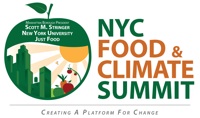
Get rich quick! Lose weight fast! We squander billions each year on scams that promise easy money and effortless weight loss. Still, the pounds pile up, the money doesn't, and our tanking bank balances and spiking weight distract us from the more remote, abstract problem of climate change.
But we could find true prosperity, improve our health, and fight global warming all at once. How? By transforming the way we produce, distribute, consume and dispose of our food.

Of course, you'll never hear this from the climate change skeptics. On the contrary, they'll tell you that we can't reduce our greenhouse gas emissions without destroying our economy and our quality of life. These fossil fueled foot-draggers are being rightfully skewered at swifthack.com, but they're doing their damnedest to derail the negotiations at the UN Climate Summit in Copenhagen, where the world's leaders are struggling to hammer out a consensus on how to reduce our collective carbon footprint.
I'm not investing all my hope in Copenhagen. I don't have to, and neither do you. Because this Saturday, we've got our own climate summit here in New York City, where our politicians are laying the groundwork for real progress on climate change by rethinking our food chain. Hosted by NYU, the NYC Food and Climate Summit is a collaboration between the university, Manhattan Borough President Scott Stringer's food policy team and the non-profit powerhouse Just Food, which promotes CSAs (community supported agriculture), urban food production and greater access to healthy food.
You don't hear much about it, but the production, distribution and disposal of food all generate a tremendous amount of greenhouse gases. Changing the way we do these things is not only one of the most effective ways to fight global warming, it has the potential to provide us with healthier food and a revitalized economy as well.
So while economists and scientists debate the merits and perils of cap and trade, Stringer and New York City Council Speaker Christine Quinn have been busy working with food policy experts and others (like me) to craft cutting edge initiatives to curb New York City's carbon "foodprint" by relocalizing our food chain, supporting urban agriculture, converting food waste to compost instead of sending it to the landfills, and so on.
Last Friday, Stringer unveiled a New York City Food Charter, with "10 Principles For a Sustainable Food System." On Monday, Quinn announced "Foodworks New York," an ambitious five-point plan to overhaul New York City's food system to create green jobs, improve access to healthy food, and preserve our environment.
Stringer and Quinn recognize that a relocalized New York City food system would provide a model of sustainability for other cities in the US and around the world. Mayor Bloomberg, who's off to Copenhagen next week to meet with 100 other mayors from around the world to discuss the critical role that cities play in reducing the world's carbon footprint, is committed to a greener Big Apple. But when he launched his sustainability initiative, PlaNYC, he left our food system out of the equation, as my fellow good food advocate Alexa Van de Walle pointed out on Huffington Post.
So a group of advocates, scholars, farmers, nutritionists, chefs, labor leaders, community gardeners, students and others--myself and Alexa included--have spent the last several years campaigning to put food issues on the table. Thanks to the extraordinary efforts of many dedicated and passionate people, and responsive, visionary politicians like Stringer and Quinn, sustainable agriculture's potential to help solve climate change is becoming more widely known. This, as much as anything that might happen in Copenhagen, gives me hope.
On Saturday, nearly a thousand folks will gather for the NYC Food and Climate Summit and learn more about the link between food and climate change from good food luminaries, legendary locavores, and a wide range of experts who'll be conducting skills-building workshops and policy sessions. Speakers include Scott Stringer, Marion Nestle, Anna Lappé, Joan Gussow, and Colin Beavan (aka No Impact Man). Conference-goers will be lunching at sustainable spots around campus - check out the map, brought to you by the Eat Well Guide! - or noshing on an eco-friendly bag lunch provided by NYU Dining Services. Seats for the summit, which is free, were "sold out" a day and a half after registration opened, indicating the tremendous interest in this subject.
As 350.org founder and longtime climate change activist Bill McKibben wrote the other day, we are at a critical juncture in the climate crisis now. McKibben warns that "politics-as-usual may mean the end of civilization."
You have three choices: you can be a denier, a defeatist, or a doer. Deniers may or may not admit that the climate is changing, but they flatly reject the notion that we're contributing to it; defeatists recognize that global warming is real and we're part of the problem, but feel helpless to do anything about it. The doers? Thousands of us are congregating in Copenhagen right now, but there are thousands more right here in New York, and all over the world. We're tackling climate change, supporting healthy food, and revitalizing our communities. Why be a doubter, or a downer, when you could be a doer?
Cross-posted from The Green Fork.